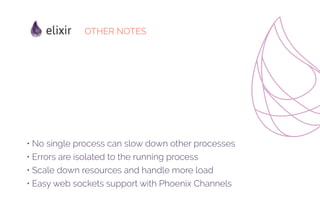Elixir Programming Language 101
- 1. A look into a modern programming language ELIXIR PROGRAMMING LANGUAGE
- 2. THE OLD WEB • Large codebases • No separation of concerns • Minimal or no tests and usually with low code coverage • Extra features before bug fixes and refactoring Single codebases
- 3. THE OLD WEB • Minimal use of HTTP verbs • Lack of understanding of HTTP cache control • No RESTFul API or Hypermedia support • Custom request/response formats (see Paypal NVP Gateway) • Mostly XML and WSDL APIs Minimal understanding of HTTP
- 4. THE OLD WEB • No separation of API and HTML generation • No language separations (PHP, HTML, CSS & JS) - Frameworks tried to help Backend generated html
- 5. THE OLD WEB • Scaling meant improving hardware (CPU or RAM) • Inefficient use of resources • Same codebase replicated on multiple nodes Vertical scalability
- 6. THE OLD WEB • FTP • SCP • Archives • Developers have access to production servers • Mutable infrastructure Manual deployments
- 8. THE MODERN WEB • Multiple codebases/apps • Bounded context • Multiple databases • Minimal shared resources • Deployed and scaled individually Separation of concerns Service/microservice oriented
- 9. • In the codebase (React, Elm, Elixir, Erlang, Haskell, Scala, Lisp) • In deployment • Stateless: JWT, Memcache/Redis ImmutabilityTHE MODERN WEB
- 10. THE MODERN WEB See https://12factor.net/ • Distributed • Scalable
- 11. THE MODERN WEB • Faster applications • Better use of CPU cores • Abstracting thread/process/ server communication • Multiple services working together Concurrency
- 12. Real time communication Standards & Best practices No devs in production Logging & Monitoring Automation THE MODERN WEB
- 13. ERLANG VM
- 14. ERLANG VM • Distributed • Fault-tolerant • Soft real-time • Highly available, non-stop applications • Hot swapping code without stopping applications Created in 1986 by Ericsson to build telecom switches Built for the following use cases:
- 15. ERLANG VM • Distributed • Fault-tolerant • Soft real-time • Highly available, non-stop applications • Hot swapping code without stopping applications Created in 1986 by Ericsson to build telecom switches Built for the following use cases:
- 16. ERLANG VM • Distributed • Fault-tolerant • Soft real-time • Highly available, non-stop applications • Hot swapping code without stopping applications Created in 1986 by Ericsson to build telecom switches Built for the following use cases:
- 17. ERLANG VM • Distributed • Fault-tolerant • Soft real-time • Highly available, non-stop applications • Hot swapping code without stopping applications Created in 1986 by Ericsson to build telecom switches Built for the following use cases:
- 18. ELIXIR • A modern language with Ruby like syntax • Compiles to Erlang VM code • Functional • Built for concurrency • Resilient • Immutable • Share nothing Actor model
- 19. ELIXIR • Everything runs in a very small VM Process • Processes as state • Sync or Async • Supervisors • Distributed/scalable out of the box • Easy to understand • Pattern matching • Hot code reload
- 20. RUBY STYLE SYNTAX defmodule Math do def sum(a, b) do do_sum(a, b) end defp do_sum(a, b) do a + b end end IO.puts Math.sum(1, 2) #=> 3 IO.puts Math.do_sum(1, 2) #=> ** (UndefinedFunctionError)
- 21. FUNCTIONAL defmodule Math do def zero?(0), do: true def zero?(x) when is_integer(x), do: false end %User{name: name, age: age} = User.get(“John Doe”) name #=> “John Doe”
- 22. FUNCTIONAL defmodule MyElixir.Emails do import Bamboo.Email import Bamboo.SendgridHelper def welcome_email(email) do template_id = Application.get_env(:my_elixir_api, MyElixirApi.Mailer)[:welcome_template_id] new_email() |> to(email) |> from(“support@example.com”) |> substitute(“%name%”, “Jon Snow”) |> with_template(template_id) end end
- 23. PATTERN MATCHING • “=” is not an assignment • “=” handles assignment and comparison at the same time • “=” can destructure complex types and assign them to variables • Fails when matching is not as expected Back to basics:
- 24. def serve_drinks(%User{age: age}) when age >= 21 do # Code that serves drinks! end serve_drinks User.get(“John Doe”) #=> Fails if the user is under 21 PATTERN MATCHING
- 25. defmodule Fib do def fib(0), do: 0 def fib(1), do: 1 def fib(n), do: fib(n-1) + fib(n-2) end PATTERN MATCHING
- 26. IMMUTABLE • You don’t know what happens to your data when you call a method • Magic moments • Hard to implement concurrent code • Race conditions • Safely share data between processes What wrong with mutability? In Elixir all data is immutable
- 27. current_process = self() # Spawn an Elixir process (not an operating system one!) pid = spawn_link(fn -> send current_process, {:msg, “hello world”} end) # Block until the message is received receive do {:msg, contents} -> IO.puts contents end PROCESSES
- 28. PROCESSES - Your code does not change if you deploy on one node or on multiple nodes • Native support for lightweight processes • Can start tens of thousands of processes • Processes are isolated • Communicate using messages • Elixir abstracts away the location of the processes
- 29. PROCESSES • A process that monitors other processes and restarts them when they crash • Multiple restart strategies • Supervisor hierarchies help you design fault tolerance • Let it crash and restart from a known state • You can supervise processes from other nodes Supervisors Each process has an inbox for incoming messages
- 30. CLUSTERS • Connect to other nodes in the network • Connected nodes can send and receive messages between processes • Run code on another node • Monitor node health Node A Node A Node B Node D Node C Node E connects to Node A ... Node E is connected to everyone else! Node D Node B Node C Node E Node E
- 31. HOT CODE RELOAD • Keep application running when updating code • Determine how your state changes for each module • Simple update API
- 32. defmodule Inc do use GenServer def start_link, do: GenServer.start_link(__MODULE__, []) def inc(i), do: GenServer.call(i, :inc) def get(i), do: GenServer.call(i, :total) def init(_), do: {:ok, 0} def handle_call(:inc, _from, total) do new_total = total + 1 # new_total = total + 2 {:reply, new_total, new_total} end def handle_call(:total, _from, total), do: {:reply, total, total} def code_change(old_vsn, state, extra) do IO.puts “New version. Moving out of #{old_vsn} #{inspect extra}” {:ok, state} end end HOT CODE RELOAD
- 33. c “inc.ex” {:ok, pid} = Inc.start_link Inc.inc(pid) # 1 ### Do code changes :sys.suspend(pid) # :ok c “inc.ex” # inc.ex:1: warning: redefining module Inc # [Inc] :sys.change_code(pid, Inc, “1”, [:hello]) # New version. Moving out of 1 [:hello] # :ok :sys.resume(pid) # :ok Inc.inc(pid) # 3 HOT CODE RELOAD
- 34. OTHER NOTES • No single process can slow down other processes • Errors are isolated to the running process • Scale down resources and handle more load • Easy web sockets support with Phoenix Channels
- 35. THANK YOU! Visit us @ around25.com






















![FUNCTIONAL
defmodule MyElixir.Emails do
import Bamboo.Email
import Bamboo.SendgridHelper
def welcome_email(email) do
template_id = Application.get_env(:my_elixir_api, MyElixirApi.Mailer)[:welcome_template_id]
new_email()
|> to(email)
|> from(“support@example.com”)
|> substitute(“%name%”, “Jon Snow”)
|> with_template(template_id)
end
end](https://image.slidesharecdn.com/elixirprogramminglanguage-180827073645/85/Elixir-Programming-Language-101-22-320.jpg)

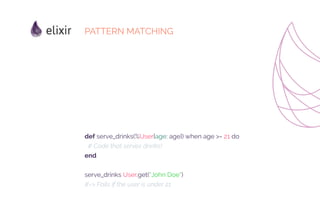
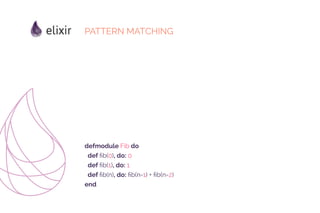
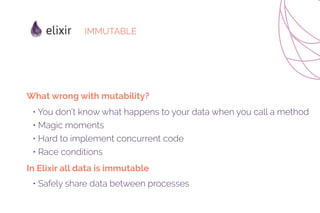


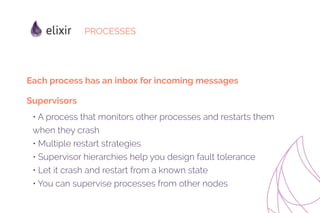


![defmodule Inc do
use GenServer
def start_link, do: GenServer.start_link(__MODULE__, [])
def inc(i), do: GenServer.call(i, :inc)
def get(i), do: GenServer.call(i, :total)
def init(_), do: {:ok, 0}
def handle_call(:inc, _from, total) do
new_total = total + 1
# new_total = total + 2
{:reply, new_total, new_total}
end
def handle_call(:total, _from, total), do: {:reply, total, total}
def code_change(old_vsn, state, extra) do
IO.puts “New version. Moving out of #{old_vsn} #{inspect extra}”
{:ok, state}
end
end
HOT CODE RELOAD](https://image.slidesharecdn.com/elixirprogramminglanguage-180827073645/85/Elixir-Programming-Language-101-32-320.jpg)
![c “inc.ex”
{:ok, pid} = Inc.start_link
Inc.inc(pid)
# 1
### Do code changes
:sys.suspend(pid)
# :ok
c “inc.ex”
# inc.ex:1: warning: redefining module Inc
# [Inc]
:sys.change_code(pid, Inc, “1”, [:hello])
# New version. Moving out of 1 [:hello]
# :ok
:sys.resume(pid)
# :ok
Inc.inc(pid)
# 3
HOT CODE RELOAD](https://image.slidesharecdn.com/elixirprogramminglanguage-180827073645/85/Elixir-Programming-Language-101-33-320.jpg)
